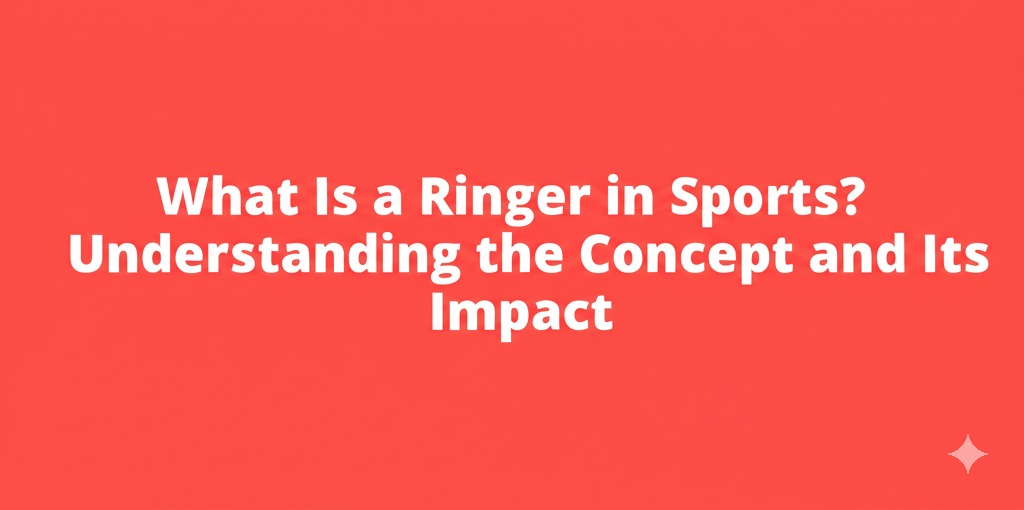In the world of sports, there’s nothing quite like a surprise twist—an underdog win, a last-minute goal, or an unexpected player dominating the game. But sometimes, those twists aren’t entirely fair. Enter the “ringer”—a term that’s been whispered on sidelines and shouted from the stands for decades.
But what exactly is a ringer in sports? And why does it stir up so much controversy?
Whether you’re a casual fan, a weekend warrior, or just curious about sports culture, understanding the role of a ringer sheds light on both the rules of the game—and the ways they’re sometimes bent.
What Is a Ringer in Sports?
A ringer is a player who secretly possesses significantly more skill, experience, or ability than what is expected or allowed in a particular competition. This person is often brought in to give one team an unfair advantage, especially in amateur, recreational, or youth-level games.
Key Characteristics of a Ringer:
- Plays down to a lower skill division or age group.
- Misrepresents their identity or skill level.
- Often not a regular member of the team.
- Used to influence the outcome of the game unfairly.
The term is most commonly used in recreational leagues, school sports, corporate tournaments, and other non-professional events where skill levels vary widely.
The Origin of the Term “Ringer”
The word “ringer” originated in 19th-century horse racing, where a faster horse would be substituted in for a slower, lesser-known horse under false registration. The deception would lead to unexpected wins—and big payoffs.
This idea of “ringing in” someone or something under false pretenses transferred to other sports and competitive events over time. Today, the phrase is used across baseball, softball, basketball, hockey, and even esports.
Why Do Teams Use Ringers?
While frowned upon (and often against the rules), some teams still try to sneak in a ringer for various reasons:
1. Desperation to Win
Some teams prioritize winning over fairness, especially in tournaments where prizes, recognition, or bragging rights are at stake.
2. Lack of Players
In some cases, a team may be short on players and bring in someone who happens to be extremely good—even if that player isn’t technically eligible.
3. Bending the Rules
Teams may find loopholes in eligibility requirements, like using a former pro who’s now “retired,” or someone from another division who wasn’t officially on the roster.
While the motives vary, the result is often the same: an uneven playing field and frustrated opponents.
How Ringers Affect Fair Play
The presence of a ringer can completely disrupt the spirit of the game. Here’s how:
- Demoralizes other teams who feel cheated.
- Undermines the integrity of leagues and tournaments.
- Discourages honest participation in future competitions.
- Can lead to disqualification or league penalties if discovered.
In youth sports especially, ringers can have long-term effects on team morale and player development.
Real-Life Examples of Ringers in Sports
While most ringer incidents don’t make headlines, a few have caught the public eye:
- Adult posing as a teen in high school sports to dominate games and win scholarships.
- Former collegiate athletes entering amateur weekend leagues under fake names.
- Esports ringers, where a higher-ranked player logs in under someone else’s account during tournaments.
These examples show how ringers aren’t just a quirky concept—they can lead to serious consequences.
How Leagues and Organizers Prevent Ringers
To maintain fair competition, many leagues implement strict measures to prevent ringers:
Common Safeguards:
- Player ID checks before games.
- Roster submission deadlines with limited substitutions.
- Skill-level caps and tiered divisions.
- Penalties for cheating, including suspensions and forfeits.
In more casual settings, enforcement is often looser, making it easier for ringers to slip through. That’s why vigilance from players, coaches, and officials is key.
Is It Ever Okay to Use a Ringer?
While technically possible in non-regulated settings, using a ringer goes against the spirit of fair play. Sports are meant to be fun, challenging, and rewarding for all participants—not just a chance to stack the odds.
That said, some pickup games or charity events might welcome high-skill players just for the fun of it—as long as everyone’s aware and on board. Transparency is everything.
Final Thoughts: Play Fair, Win Right
A ringer in sports might lead to short-term wins, but it often leaves behind a trail of resentment, frustration, and damaged reputations. Whether you’re on the court, the field, or behind a controller, remember:
Fair play is the foundation of true competition.
So next time you hear whispers of a suspiciously skilled “new guy,” think twice before cheering him on—unless he’s playing by the same rules as everyone else.

Yara Bryant is a dedicated sports journalist with a knack for breaking down game strategies and delivering in-depth analysis. With a strong background in sports coverage, she specializes in football, basketball, and motorsports, bringing fans the latest news, insights, and predictions.


No responses yet